The Refugee Olympic Team embodies the unbreakable human spirit, offering a global stage to displaced athletes and symbolizing their extraordinary courage and resilience. Emerging from regions ravaged by war and violence, these athletes showcase the best of humanity, demonstrating strength and perseverance amid adversity.
Despite enduring traumatic experiences and witnessing extreme violence, the team stands as a beacon of hope and unity. Rising above the devastation of war, overcrowded rescue boats, and barren refugee camps, they represent the antithesis of destruction, shining as a symbol of hope and light in our darkest times.
Rising from visuals of destructive fire, overcrowded rescue boats, and desolate refugee camps, these individuals represent to the world the very antithesis of war and destruction; rather the team emerges as a glimmer of hope, unity, and a beam of light from these troubled times.
History and Origins
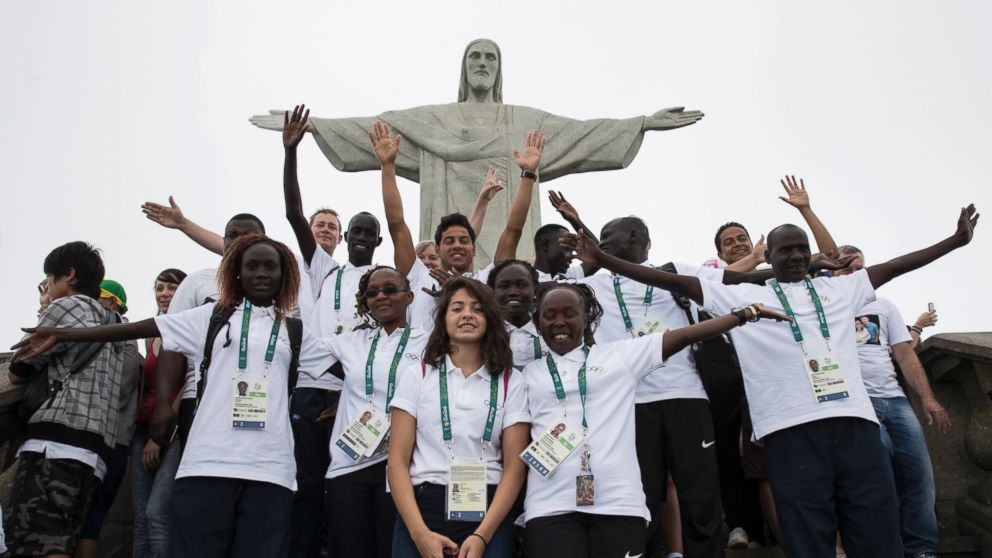
The concept of the Refugee Olympic Team emerged as a response to the growing global refugee crisis, with millions of people forced to flee their homes due to war, persecution, and violence. In 2016, the International Olympic Committee (IOC) took a bold step by creating a team of refugee athletes to compete in the Rio de Janeiro Summer Olympics. This historic decision marked the first time in Olympic history that a team comprised solely of refugees would participate, competing under the Olympic flag rather than representing any one nation.
The inaugural team saw ten athletes from countries such as Syria, South Sudan, Ethiopia, and the Democratic Republic of Congo. These athletes, who had been displaced by conflict and were living in host countries around the world, were selected not only for their athletic abilities but also for their extraordinary stories of survival and determination. Competing in sports ranging from swimming to track and field, the Refugee Olympic Team became a symbol of hope, showing that even in the face of immense adversity, greatness can be achieved.
Refugee Olympic Athletes’ Stories: Tales of Empowerment
The stories of the athletes on the Refugee Olympic Team are as diverse as they are inspiring. Each athlete brings a unique narrative of struggle, survival, and triumph, reflecting the broader experiences of refugees worldwide.
Yusra Mardini: From Syrian Refugee to Olympic Swimmer
Yusra Mardini’s journey to the Olympics began in the war-torn city of Damascus, Syria. Forced
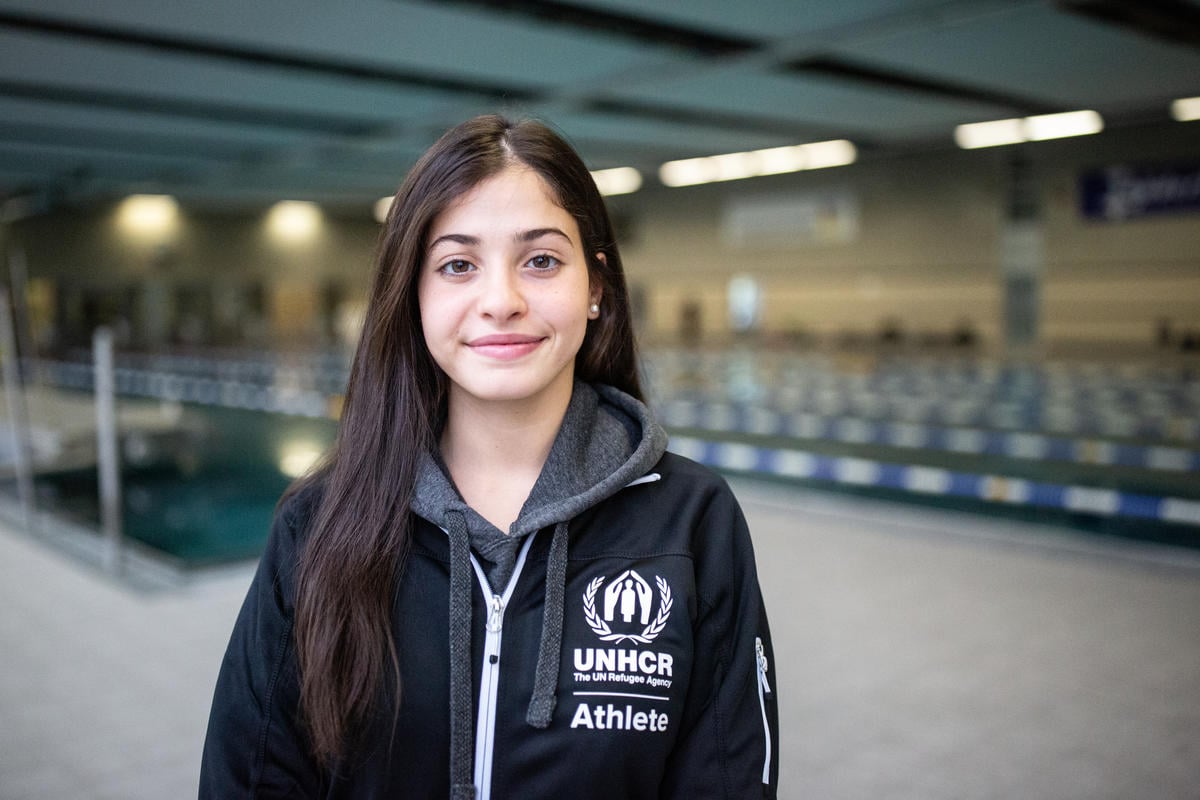
to flee her home in 2015 due to the ongoing civil war, Yusra and her sister embarked on a perilous journey across the Mediterranean Sea. When the overcrowded boat they were in began to sink, Yusra and her sister jumped into the water and swam for hours, pushing the boat to safety and saving the lives of those on board. Her story of survival captured the world’s attention, and a year later, she competed in the Rio Olympics as part of the Refugee Olympic Team. Yusra’s participation in the Olympics was not just about winning medals; it was about showing the world that refugees are more than their circumstances—they are survivors, fighters, and achievers.
Tegla Loroupe: The Champion for Peace and Refugees
Tegla Loroupe, a former marathon world record holder from Kenya, served as the chef de mission for the Refugee Olympic Team in 2016. Although not a refugee herself, Loroupe has dedicated her life to advocating for peace and supporting refugees. She has used her platform to raise awareness about the plight of displaced people and has organized various peace marathons in conflict zones. Under her leadership, the Refugee Olympic Team became more than just a group of athletes; it became a movement, a call to action for the world to stand with refugees and recognize their potential.
Under her leadership, the Refugee Olympic Team not only competed but also garnered significant international support, raising awareness and funds for refugees globally.
James Nyang Chiengjiek: Escaping War to Pursue Dreams
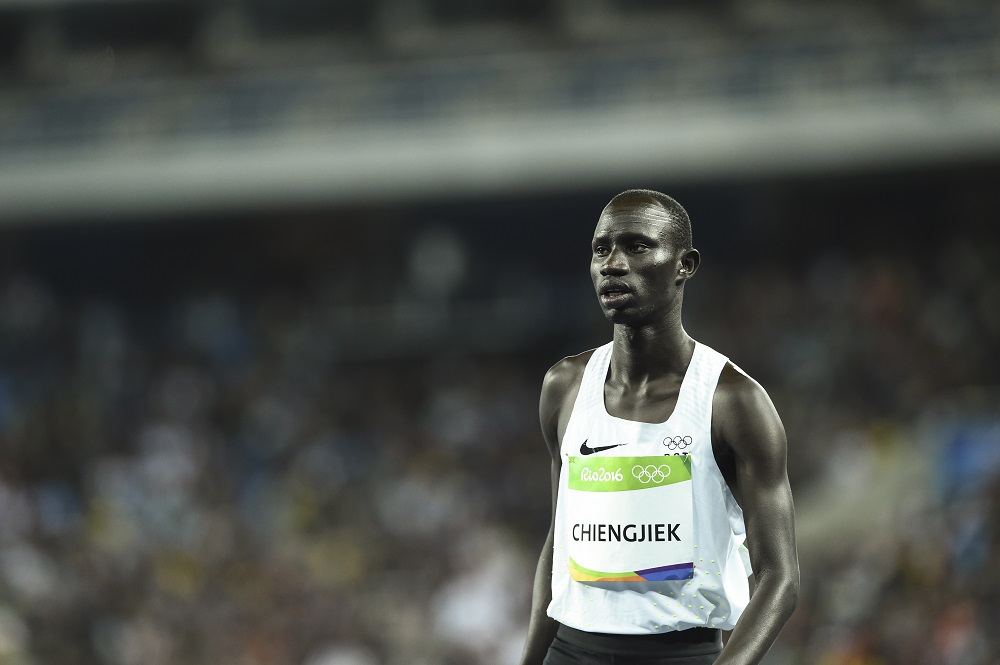
James Nyang Chiengjiek’s story is one of resilience and perseverance. Born in South Sudan, James was forced to flee his home at a young age to escape the brutal civil war that claimed the lives of many of his family members. He sought refuge in Kenya, where he discovered his talent for running. Despite the challenges of training in a refugee camp with limited resources, James never gave up on his dream of becoming an athlete. In 2016, he represented the Refugee Olympic Team in the 800-meter race, a moment that marked the culmination of years of hard work and determination. James’ story is a testament to the power of hope and the belief that with perseverance, even the most daunting obstacles can be overcome.
Anjelina Nadai Lohalith: Running for a Better Future
Anjelina Nadai Lohalith, another South Sudanese athlete, found herself displaced by the civil war at the age of six. She was separated from her parents and has lived in a refugee camp in Kenya ever since. Despite the hardships, Anjelina discovered her passion for running, which provided her with a sense of purpose and hope. She trained tirelessly, often running barefoot on the rough terrain of the refugee camp. Her dedication paid off when she was selected to join the Refugee Olympic Team in 2016, competing in the 1500-meter event. For Anjelina, running is not just a sport; it is a way to build a better future, both for herself and for other refugees.
Popole Misenga: Overcoming Adversity through Judo
Popole Misenga’s journey to the Olympics is marked by profound loss and incredible resilience. Born in the Democratic Republic of Congo, Popole lost his family during the country’s brutal civil war. At the age of nine, he was separated from his brother and spent eight days alone in the rainforest before being rescued. He eventually found refuge in Brazil, where he discovered judo—a sport that would change his life. Despite the trauma of his past, Popole channeled his pain into his training, becoming a skilled judoka. In 2016, he competed in the judo competition as part of the Refugee Olympic Team, a moment that symbolized not just personal triumph, but the power of sports to heal and transform lives.
Popole Misenga continued to compete and inspire, representing the Refugee Olympic Team again in the 2020 Tokyo Olympics.
Rose Lokonyen: From Refugee Camp to Olympic Track
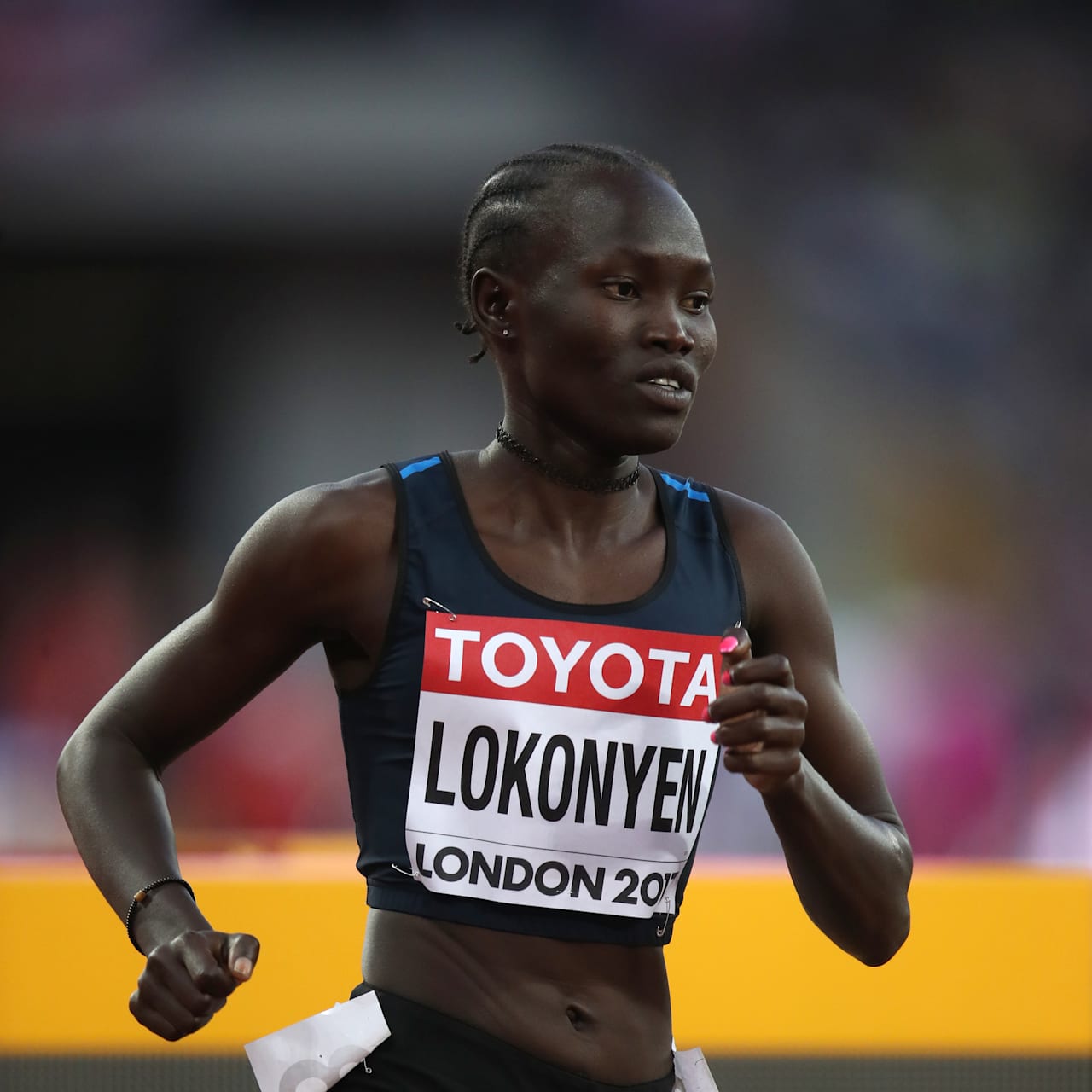
Rose Lokonyen, a middle-distance runner from South Sudan, spent most of her childhood in the Kakuma refugee camp in Kenya after fleeing the violence in her home country. Life in the camp was tough, with limited access to basic necessities and education. However, Rose found solace in running, which became her escape from the harsh realities of life in the camp. Her talent was recognized when she won a local race, which led to her selection for the Refugee Olympic Team. Competing in the 800 meters at the Rio Olympics, Rose’s journey from a refugee camp to the world’s biggest sporting stage serves as an inspiration to millions of displaced people around the world.
In the 2020 Tokyo Olympics, Rose Lokonyen continued to represent the Refugee Olympic Team, once again inspiring millions with her story.
Medal-Winning Achievements: 2024 Paris Olympics
The 2024 Paris Olympics marked a significant milestone for the Refugee Olympic Team, with the team winning their first Olympic medal. Kimia Alizadeh, a taekwondo athlete from Iran, won a bronze medal in the women’s 57 kg category. Her victory not only brought pride to the team but also highlighted the potential of refugee athletes on the global stage.
Awards, Medals, and Achievements
The Refugee Olympic Team may not have the extensive medal count of established national teams, but their achievements go far beyond podium finishes. Each athlete’s journey to the Olympics is itself a remarkable accomplishment, representing the triumph of the human spirit over unimaginable adversity.
-
Kimia Alizadeh (2024 Paris Olympics)
- Bronze Medal in Taekwondo: Kimia Alizadeh, an Iranian refugee, made history at the 2024 Paris Olympics by winning the team’s first-ever Olympic medal. Competing in the women’s 57 kg taekwondo category, her victory was a significant milestone for the Refugee Olympic Team, highlighting the potential and talent of refugee athletes on the global stage.
-
Yusra Mardini (Rio 2016, Tokyo 2020, Paris 2024)
- Laureus Sport for Good Award: Yusra Mardini, a Syrian refugee swimmer, became a global symbol of hope and resilience. Though she did not win a medal, her participation in three consecutive Olympics and her humanitarian work earned her the prestigious Laureus Sport for Good Award. Her story inspired millions and brought attention to the refugee crisis.
-
Popole Misenga (Rio 2016, Tokyo 2020)
- International Judo Federation’s Courage Award: Popole Misenga, a judoka from the Democratic Republic of Congo, was recognized by the International Judo Federation for his courage and perseverance. Competing in both the Rio and Tokyo Olympics, Misenga’s journey from conflict and displacement to the Olympic stage showcased the transformative power of sports.
-
Rose Lokonyen (Rio 2016, Tokyo 2020)
- UNHCR’s Nansen Refugee Award Nominee: Rose Lokonyen, a middle-distance runner from South Sudan, was nominated for the UNHCR’s Nansen Refugee Award, which honors extraordinary service to the forcibly displaced. Her achievements on the track, combined with her advocacy for refugees, made her a prominent figure in the global refugee movement.
-
James Nyang Chiengjiek (Rio 2016)
- IOC Olympic Laurel: James Nyang Chiengjiek was honored with the IOC Olympic Laurel for his contributions to promoting peace and unity through sports. His participation in the 800-meter race at the Rio Olympics was a powerful statement of resilience and the pursuit of dreams against all odds.
These achievements, while not always measured in medals, underscore the incredible perseverance and impact of the Refugee Olympic Team. Their stories resonate far beyond the competition, serving as a powerful reminder of the strength of the human spirit.
Symbolism and Impact
The Refugee Olympic Team is more than just a group of athletes; it is a symbol of global solidarity and the enduring human spirit. By competing on the Olympic stage, these athletes draw attention to the plight of over 100 million displaced people worldwide, many of whom have lost everything. The team sends a powerful message: that refugees are not just victims, but
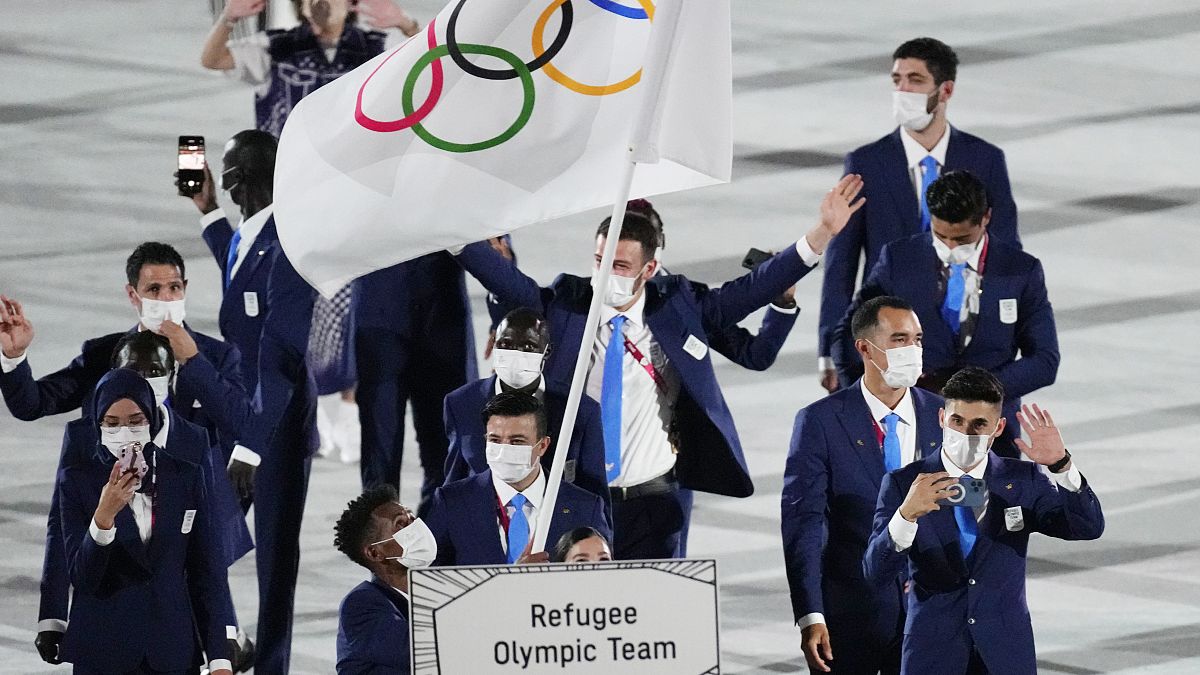
individuals with dreams, talents, and aspirations.
At the Paris 2024 Olympics, the Refugee Olympic Team achieved a historic milestone, winning their first-ever Olympic medal. Kimia Alizadeh, a taekwondo athlete originally from Iran, won the bronze medal in the women’s 57kg category. Her victory not only highlighted her exceptional talent but also brought global attention to the ongoing struggles faced by refugees. Kimia’s journey from fleeing her homeland to standing on the Olympic podium is a story of resilience and triumph that resonates with millions around the world.
Their participation in the Olympics also serves as an inspiration to other refugees, offering a sense of representation and hope. In a world where refugees are often marginalized and voiceless, the team provides a platform for them to share their stories and demonstrate their resilience.
The global response to the Refugee Olympic Team has been overwhelmingly positive. Media coverage has amplified their stories, while public figures and organizations have rallied in support. This support has helped shift the narrative around refugees, highlighting their contributions to society and challenging the stigma they often face.
Challenges and Criticisms
Despite the positive impact of the Refugee Olympic Team, it has not been without its challenges. Logistically, organizing a team of athletes from different countries, with varied training backgrounds and resources, is a complex task. The athletes often lack access to the same facilities, coaching, and support systems as their counterparts from national teams.
Moreover, the team has faced some criticism, with detractors arguing that it could detract from national teams or that it is a symbolic gesture rather than a solution to the refugee crisis. However, these criticisms are often countered by the powerful stories of the athletes themselves and the undeniable positive impact of their participation on the global stage.
What’s In For The Future?
Looking ahead, the Refugee Olympic Team is likely to continue evolving. The IOC has committed to supporting refugee athletes and ensuring that they have the opportunity to compete at the highest levels. This includes not only participation in future Olympic Games but also the development of training programs and resources to help these athletes succeed.
The legacy of the Refugee Olympic Team will likely extend far beyond the Olympic Games. It serves as a reminder that sport has the power to unite people, transcend borders, and bring attention to critical global issues. For the millions of refugees around the world, the team offers a beacon of hope- proof that despite the most challenging circumstances, it is possible to achieve greatness.
A Symbol of Resilience
The Refugee Olympic Team is a symbol of resilience, courage, and the unbreakable human spirit. As they compete under the Olympic flag, these athletes carry the hopes and dreams of millions of refugees worldwide. Their stories inspire us all to look beyond borders and see the shared humanity that unites us. In a world often divided, the Refugee Olympic Team reminds us that we are all part of a global community and that with hope and determination, we can overcome even the most daunting challenges.
Find out more about the IOC Refugee Olympic Team.
Read More:
2024 Paris Olympics is Historic for Featuring 50 Percent Women Athletes for the First Time
















